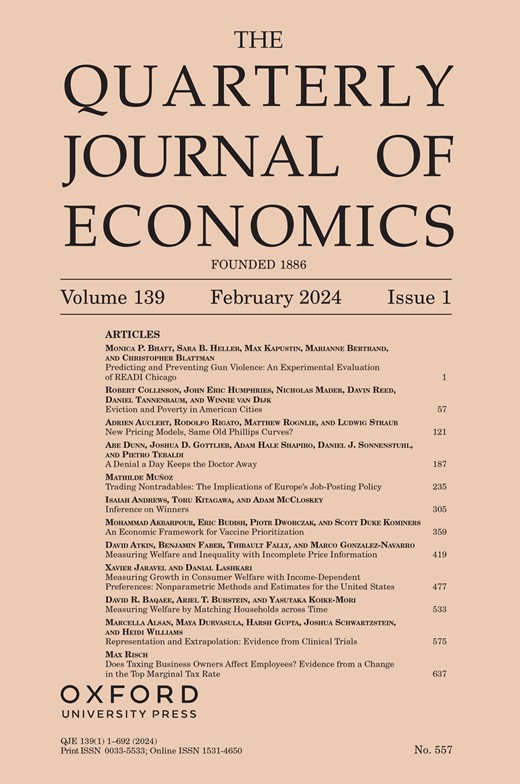Choose to Lose: Health Plan Choices from a Menu with Dominated Option
IF 12.7
1区 经济学
Q1 ECONOMICS
引用次数: 209
Abstract
We examine the health plan choices that 23,894 employees at a U.S. firm made from a large menu of options that differed only in financial cost-sharing and premium. These decisions provide a clear test of the predictions of the standard economic model of insurance choice in the absence of choice frictions because plans were priced so that nearly every plan with a lower deductible was financially dominated by an otherwise identical plan with a high deductible. We document that the majority of employees chose dominated plans, which resulted in excess spending equivalent to 24% of chosen plan premiums. Low-income employees were significantly more likely to choose dominated plans, and most employees did not switch into more financially efficient plans in the subsequent year. We show that the choice of dominated plans cannot be rationalized by standard risk preference or any expectations about health risk. Testing alternative explanations with a series of hypothetical-choice experiments, we find that the popularity of dominated plans was not primarily driven by the size and complexity of the plan menu, nor informed preferences for avoiding high deductibles, but by employees’ lack of understanding of health insurance. Our findings challenge the standard practice of inferring risk preferences from insurance choices and raise doubts about the welfare benefits of health reforms that expand consumer choice.选择丢失:从具有主导选项的菜单中选择健康计划
我们研究了一家美国公司23,894名员工的健康计划选择,他们选择的健康计划只有财务成本分担和保费不同。在没有选择摩擦的情况下,这些决定对保险选择的标准经济模型的预测提供了一个清晰的测试,因为计划的定价使得几乎每个免赔额较低的计划在财务上都被另一个具有高免赔额的相同计划所主导。我们发现,大多数员工选择了主导计划,这导致了相当于所选计划保费24%的超额支出。低收入员工更有可能选择主导计划,而且大多数员工在接下来的一年里没有转向更经济有效的计划。我们的研究表明,显性计划的选择不能通过标准风险偏好或对健康风险的任何预期来合理化。通过一系列的假设选择实验,我们发现主导计划的流行主要不是由于计划菜单的规模和复杂性,也不是出于避免高免赔额的知情偏好,而是由于员工对健康保险缺乏了解。我们的研究结果挑战了从保险选择中推断风险偏好的标准做法,并对扩大消费者选择的医疗改革的福利效益提出了质疑。
本文章由计算机程序翻译,如有差异,请以英文原文为准。
求助全文
约1分钟内获得全文
求助全文
来源期刊

Quarterly Journal of Economics
ECONOMICS-
CiteScore
24.20
自引率
2.20%
发文量
42
期刊介绍:
The Quarterly Journal of Economics stands as the oldest professional journal of economics in the English language. Published under the editorial guidance of Harvard University's Department of Economics, it comprehensively covers all aspects of the field. Esteemed by professional and academic economists as well as students worldwide, QJE holds unparalleled value in the economic discourse.
 求助内容:
求助内容: 应助结果提醒方式:
应助结果提醒方式:


